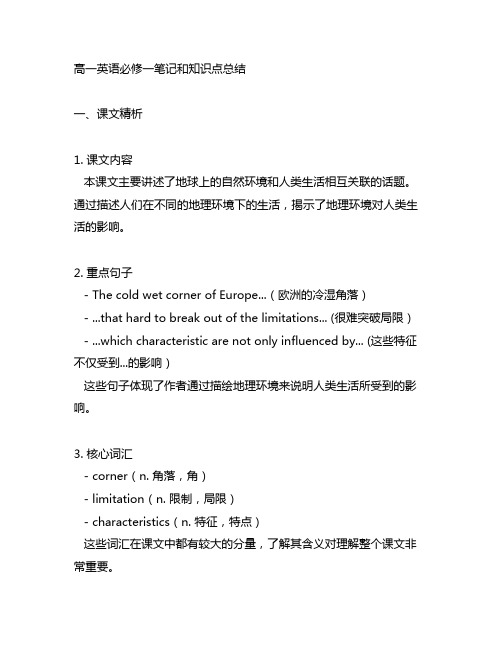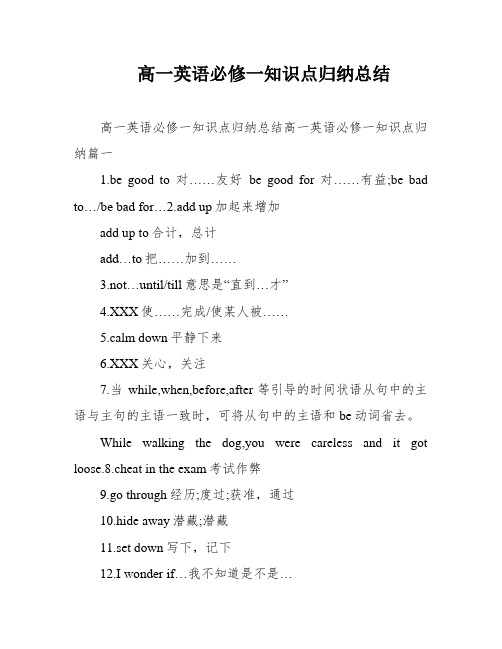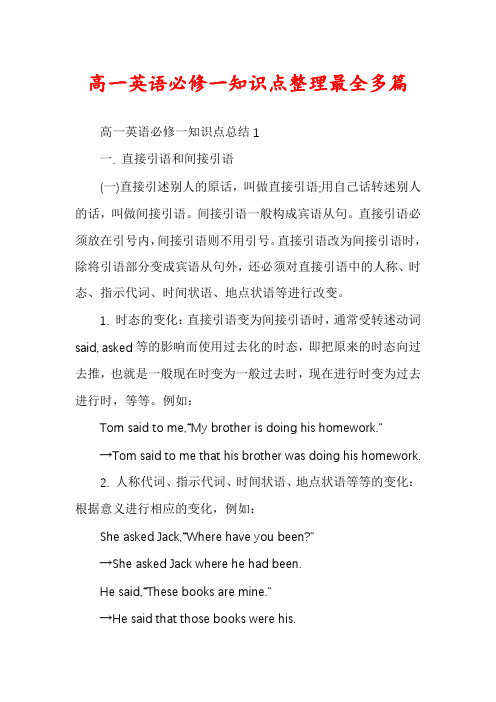高一英语必修一知识点总结5篇
高一英语必修一笔记和知识点总结

高一英语必修一笔记和知识点总结一、课文精析1. 课文内容本课文主要讲述了地球上的自然环境和人类生活相互关联的话题。
通过描述人们在不同的地理环境下的生活,揭示了地理环境对人类生活的影响。
2. 重点句子- The cold wet corner of Europe...(欧洲的冷湿角落)- ...that hard to break out of the limitations... (很难突破局限) - ...which characteristic are not only influenced by... (这些特征不仅受到...的影响)这些句子体现了作者通过描绘地理环境来说明人类生活所受到的影响。
3. 核心词汇- corner(n. 角落,角)- limitation(n. 限制,局限)- characteristics(n. 特征,特点)这些词汇在课文中都有较大的分量,了解其含义对理解整个课文非常重要。
二、语法重点1. 定语从句本单元的课文中有多处涉及定语从句的使用,如“that hard to break out of the limitations”,“which characteristic are not only influenced by”。
定语从句在句子中修饰名词,起到限定或说明的作用。
2. 被动语态课文中也有多处被动语态的使用,如“The cold wet corner of Europe is inhabited by...”。
被动语态常用于当主语是动作的接受者而不是执行者时。
3. 形容词比较级课文中出现了多处形容词比较级的用法,如“cold wet”,“hard to break out of”。
比较级用于对两者或多者做比较,表示较高、较大或较多。
三、词汇总结1. 当前流行学习法本单元学习了如何通过后缀构词,如“-ful(充满...的)”、“-less(无...的)”,提高对词汇的理解和记忆。
高一年级英语必修一知识点笔记

高一年级英语必修一知识点笔记(实用版)编制人:______审核人:______审批人:______编制单位:______编制时间:__年__月__日序言下载提示:该文档是本店铺精心编制而成的,希望大家下载后,能够帮助大家解决实际问题。
文档下载后可定制修改,请根据实际需要进行调整和使用,谢谢!并且,本店铺为大家提供各种类型的实用资料,如教案大全、书信范文、述职报告、合同范本、工作总结、演讲稿、心得体会、作文大全、工作计划、其他资料等等,想了解不同资料格式和写法,敬请关注!Download tips: This document is carefully compiled by this editor.I hope that after you download it, it can help you solve practical problems. The document can be customized and modified after downloading, please adjust and use it according to actual needs, thank you!Moreover, our store provides various types of practical materials for everyone, such as lesson plans, letter templates, job reports, contract templates, work summaries, speeches, reflections, essay summaries, work plans, and other materials. If you want to learn about different data formats and writing methods, please stay tuned!高一年级英语必修一知识点笔记本店铺为各位同学整理了《高一年级英语必修一知识点笔记》,希望对你的学习有所帮助!1.高一年级英语必修一知识点笔记篇一主动形式表被动意义①当feel、look、smell、taste、sound等后面接形容词时;当cut、read、sell、wear、write等词带状语修饰语时;当动词表示开始、结束、关、停、转、启动等意义时。
高一年级英语必修一知识点总结(优秀4篇)

高一年级英语必修一知识点总结(优秀4篇)对于刚刚升入高中的高一学子来说,高一的英语的难度与深度都不是初中英语可以媲美的,那么该怎么学习呢?下面作者为大家整理了4篇高一年级英语必修一知识点总结,希望可以帮助您更好的写作高一英语必修一知识点总结。
高一英语必修一的知识点梳理篇一in the end, finally, at last三者均可表示“(经过周折、等待、耽误)较后,终于”之意。
不同的是:finally 一般用在句中动词前面,而at last 与in the end 的位臵则较为灵活;三者中at last 语气较为强烈,且可单独作为感叹句使用。
After putting it off three times, we finally managed to have a holiday in Dalian.At last he knew the meaning of life.At last! Where on earth have you been?But in the end he gave in.另外,finally还可用在列举事项时,引出较后一个内容,相当于lastly。
Firstly, we should make a plan; secondly, we should carry it out; finally we should make a conclu- sion.高一英语必修一的知识点篇二Be getting on well with one’s study某人的学习越来越好take several courses at school在学校学若干门课程have English (Chinese, Physics…) every (other )day work hard at…put one’s heart into…专心于;致力于be interested in…be fond oflike chemistry bestbe good at…; be poor at…; do well in…; be weak in…make progress in…; fail in…’ be tired of…’pass the examination; give sb. a passing grade;major in history主修历史He has the best record in school.他的成绩较棒。
高一英语必修一知识点总结分享优秀4篇

高一英语必修一知识点总结分享优秀4篇英语高一必修1知识点总结篇一1、distance n.距离?归纳拓展at/from a distance of在/从……远的地方in the distance 在远处keep a distance away(from) (与某人或某物)保持一定距离;(对某人或某物)冷淡,疏远[英文典例] ① A shark can smell blood at a distance of half a kilometer.鲨鱼能在半公里外闻到血腥味。
②The lion looks dangerous,so I decide to keep a distance away from it.狮子看起来很危险,所以我决定离它远点儿。
③We saw lights in the distance.我们看到了远处的点点灯光。
2.reduce vt.amp;vi.减少,降低,折扣?归纳拓展reduce(from.。
.)to.。
. (从……)减少/降低到reduce by减少了,降低了(降低的幅度)reduce sb.使处于(某种状态),使成为[英文典例] ① She reduced her weight by 5 kilograms.她把体重减轻了五公斤。
②In order to reduce the price of their products,they will take measures to reduce costs at first.为了降低产品价格,他们将采取措施首先减少成本。
③If you buy more than 5 at a time,we will reduce the price by 10 percent.如果你一次买五个以上,我们就给你减价10%。
?名师点津表示增减升降的起/终点,用from/to,幅度用介词by,能够搭配的动词有rise,raise,grow,fall,increase,decrease,reduce等。
高一英语必修一复习知识点笔记

高一英语必修一复习知识点笔记1.高一英语必修一复习知识点笔记篇一present perfect and past simple。
现在完成时和一般过去式,现在完成时表示发生在过去的事情对现在依然有明显的影响发生在过去的动作但是不知道动作发生的时间或对动作发生的确切时间不感兴趣。
现在完成时经常和下列时间状语连用:Before, ever, never, already, and , yet. already 用于肯定句,yet用于疑问句和否定句。
Venus and Serena have played each other before.(重要的事他们过去进行了比赛,但是何时比赛并不重要—现在完成时)Venus and Serena have played each other in June 1999.(我们知道此事发生的确切时间—一般过去时)2.高一英语必修一复习知识点笔记篇二一、过去将来时参照一般将来时对比:用would do、was / were going to do sth.表过去将来;come、go、leave等过去进行时表过去将来时;was / were to do sth.和was / were about to do sth.表过去将来。
二、过去进行时①过去某一时刻正在进行的动作或某一阶段内发生或频繁发生。
②某一动作发生时另一动作正在发生,其中一个在由when或while引导的时间状语从句中。
三、现在完成时①现在完成时除可以和for、since引导的状语连用外,还可以和下面的介词短语连用:during / in /over the last(past)few years (months, weeks)、in recent years 等。
②下列句型中常用现在完成时It is (has been) + 一段时间 + since从句This(That / It)is the first(second…)time that + 完成时This(That / It)is the only … + that + 完成时This(that / It)is the best / finest / most interesting … + that 从句 + 完成时③在时间或条件状语从句中,现在完成时可以代替一般将来时。
高一英语必修一语法知识点总结

高一英语必修一语法知识点总结高一英语必修一语法知识点1高一英语必修一知识点总结:Unit11.be good to对……友好be good for对……有益;be bad to…/be bad for…2.add up加起来增加add up to合计,总计add…to把……加到……3.not…until/till意思是“直到…才”4.get sth/sb done使……完成/使某人被……5.calm down平静下来6.be concerned about关心,关注7.当while,when,before,after 等引导的时间状语从句中的主语与主句的主语一致时,可将从句中的主语和be动词省去。
While walking the dog,you were careless and it got loose.8.cheat in the exam考试9.go through经历;度过;获准,通过10.hide away躲藏;隐藏11.set down写下,记下12.I wonder if…我不知道是不是…12.on purpose故意13.sth happen to sb某人发生某事sb happen to do sth某人碰巧做某事it so happened that……正巧碰巧14.It is the first(second…)that…(从句谓语动词用现在完成时)15.in one’s power处于……的控制之中16.It’s no pleasure doing…做…没有乐趣It’s no good/use doing sth.做某事是没好处/没用的17.She found it difficult to settle and calm down in the hiding place.it做形式宾语18.suffer from患…病;遭受19.so…that…/such…thay…20.get tired of…对…感到劳累疲惫21.have some trouble with sb/sth.在……上遇到了麻烦22.get along with sb/sth.与某人相处23.ask(sb)for advice.(向某人)征求建议24.make后接复合宾语,宾语补足语须用不带to的不定式、形容词、过去分词、名词等。
高一英语必修一知识点归纳总结

高一英语必修一知识点归纳总结高一英语必修一知识点归纳总结高一英语必修一知识点归纳篇一1.be good to对……友好be good for对……有益;be bad to…/be bad for…2.add up加起来增加add up to合计,总计add…to把……加到……3.not…until/till意思是“直到…才”4.XXX使……完成/使某人被……5.calm down平静下来6.XXX关心,关注7.当while,when,before,after等引导的时间状语从句中的主语与主句的主语一致时,可将从句中的主语和be动词省去。
While walking the dog,you were careless and it got loose.8.cheat in the exam考试作弊9.go through经历;度过;获准,通过10.hide away潜藏;潜藏11.set down写下,记下12.I wonder if…我不知道是不是…12.on purpose故意13.XXX某人发生某事XXX do XXX某人碰巧做某事it XXX……正巧碰巧14.It is the first(second…)that…(从句谓语动词用现在完成时)15.in one’s power处于……的控制之中16.It’s no pleasure doing…做…没有乐趣It’s no good/use doing sth.做某事是没优点/没用的17.She found it difficult to XXX.it做形式宾语18.suffer from患…病;遭受19.XXX…20.get tired of…对…感触劳顿怠倦21.have XXX在……上遇到了麻烦22.get along with sb/sth.与某人相处23.ask(sb)for advice.(向某人)征求建议24.make后接复合宾语,宾语补足语须用不带to的不定式、形容词、过去分词、名词等。
高一英语必修一知识点整理最全多篇

高一英语必修一知识点整理最全多篇高一英语必修一知识点总结1一. 直接引语和间接引语(一)直接引述别人的原话,叫做直接引语;用自己话转述别人的话,叫做间接引语。
间接引语一般构成宾语从句。
直接引语必须放在引号内,间接引语则不用引号。
直接引语改为间接引语时,除将引语部分变成宾语从句外,还必须对直接引语中的人称、时态、指示代词、时间状语、地点状语等进行改变。
1. 时态的变化:直接引语变为间接引语时,通常受转述动词said, asked等的影响而使用过去化的时态,即把原来的时态向过去推,也就是一般现在时变为一般过去时,现在进行时变为过去进行时,等等。
例如:Tom sai d to me,“My brother is doing his homework.”→Tom said to me that his brother was doing his homework.2. 人称代词、指示代词、时间状语、地点状语等等的变化:根据意义进行相应的变化,例如:She asked Jack,“Where have you been?”→She asked Jack where he had been.He said,“These books are mine.”→He said that those books were his.(二)直接引语改为间接引语时,都使用陈述语序,但是因为原句的句式不同,所以变成间接引语时所用的连词会有所不同。
直接引语如果是一般疑问句,用连接词whether或if;如果是特殊疑问句,则用疑问词引导间接引语。
转述的动词一般用asked,可以在其后加上一个间接宾语me, him, her, us等。
如:She said,“Is your father at home?”→S he asked me if/whether my father was at home.“What do you do every Sunday?”My friend asked me.→My friend asked me what I did every Sunday.直接引语如果是祈使句,改为间接引语时,要将祈使句的动词原形变为带to的不定式,并在不定式的前面根据原句的语气(即请求或命令)加上ask, tell, order等动词,如果祈使句为否定式,则在不定式前加not。
- 1、下载文档前请自行甄别文档内容的完整性,平台不提供额外的编辑、内容补充、找答案等附加服务。
- 2、"仅部分预览"的文档,不可在线预览部分如存在完整性等问题,可反馈申请退款(可完整预览的文档不适用该条件!)。
- 3、如文档侵犯您的权益,请联系客服反馈,我们会尽快为您处理(人工客服工作时间:9:00-18:30)。
高一英语必修一知识点总结高一英语必修一知识点总结5篇总结是事后对某一阶段的学习、工作或其完成情况加以回顾和分析的一种书面材料,它可以促使我们思考,让我们来为自己写一份总结吧。
总结你想好怎么写了吗?下面是小编收集整理的高一英语必修一知识点总结,欢迎大家分享。
高一英语必修一知识点总结11、 especially, speciallyespecially adv. 特殊地;尤其是(1)侧重于多种事物或人中比较突出的。
I like all the subjects at school, especially English. (尤其是英语)(2)especially 后可接介词短语或从句。
I like the Yuelu Mountains, especially in spring. (尤其是在春天)Noise is unpleasant, especially when you are trying to sleep.specially 侧重特意地、专门地做某事(后面常接for sb. 或to do sth.)I made a chocolate cake specially for you.2、 boring, bored, boreboring adj. 令人厌烦的 The book is very boring.bored adj. 感到厌烦的 I'm bored with the book.bore vt. 令人厌烦 This book bores me.有些表示情感的及物动词,有与bore类似的用法。
如:interest, excite, surprise, amaze, frighten, astonish, move, inspire, touch, scare, disappoint, puzzle, worry 这类词的现在分词形式,为“令人……”;过去分词形式,为“感到……”。
3、 except for, except, but, besides表示“除了”的词或短语有:except; but; except for; besides; except that (when.。
.)等。
(1)except 和but 都表示“除了……之外。
没有”,二者大多数情况下可以互换;但在no, all, nobody, nothing, no one 等词后多用 but。
No one knows our teacher's address except / but him. (排除him)(2) besides 除……之外,还……,有附加性。
What other foreign languages do you know besides English? (English与other languages都属于know的范围)(3) except for 只不过……,整体肯定,部分修正,用于排除非同类事物,for表示细节上的修正。
Your article is well written except for a few spelling mistakes.4、 know, know of, know about(1) know 用作动词,意思是“(直接地)获知,懂得,认识,熟悉”。
I don't know whether he is here or not. / I know him to be honest.(2) know of和know about的意思都是“(间接地)获知”,指听别人说到或从书报上看到,二者没有什么区别。
5、 for example; such as(1)for example“例如”,用来举例说明某一论点或情况。
一般只举同类人或物中的“一个”为例,作插入语,可位于句首、句中或句末。
可用for instance替换。
For example, air is invisible. / His spelling is terrible! Look at this word, for example.(2)such as “例如”,用来列举事物,一般列举同类人或事物中的几个例子。
插在被列举的事物与前面的名词之间,as后面不可有逗号。
Some of the European Languages come from Latin, such as French, Italian and Spanish.[注意]如把前面所述情况全部举出,用that is或namely。
高一英语必修一知识点总结2一、一般过去将来时1、概念:立足于过去某一时刻,从过去看将来,常用于宾语从句中。
2、时间状语:The next day (morning, year…),thefollowing month(week…),etc.3、基本结构:主语+was/were +going to + do+其它;主语+would/should + do+其它4、否定形式:主语+was/were+not + going to + do; 主语+would/should + not + do.5、一般疑问句:was或were放于句首;would/should 提到句首。
6、例句:He said he would go to Beijing the next day.他说他第二天要去北京。
I asked who was going there.我问,谁要去那里。
二、现在进行时1、概念:表示现阶段或说话时正在进行的动作及行为。
2、时间状语:Now, at this time, days, etc. look. listen3、 基本结构:主语+be +doing +其它4、否定形式:主语+be +not +doing+其它5、一般疑问句:把be动词放于句首。
6、例句:How are you feeling today?你今天感觉如何?He is doing well in his lessons.在课上他表现得很好。
高一英语必修一知识点总结3as 可作关系代词,引导定语从句。
1.asas可以在限制性定语从句和非限制性定语从句中作主语或宾语。
① 在限制性定语从句中,as可跟在由suc, so, the same修饰的'先行词之后。
Such men as heard him were deeply moved. 听过他说话的人,都会深受感动。
(as在定语从句中作heard的主语)I've never heard such stories as he tells. 我从未听过像他讲的这样的故事。
(as在定语从句中作tell的宾语)He lifted so heavy a stone as no one else can lift. 他搬起别人都搬不起的大石头。
(as在定语从句中lift的宾语)比较:在the same高一英语必修一知识点总结4各种时态的被动语态被动语态概述被动语态的概念:它是动词的一种形式,表示主语与谓语之间的执行或被执行关系。
主动语态表示主语是谓语动作的执行者,例如:They saw the little boy crying by the river. 被动语态表示主语是谓语动作的承受者,例如:The little boy was seen crying by the river.被动语态的构成被动语态的形式是由“助动词be+动词的过去分词”构成。
助动词be随着主语的人称、数、时态等的不同而变化。
几种常见时态的被动语态形式如下:1、一般现在时 am/is/are + 过去分词例如:Rice is planted in the south of China.2、一般过去时 was/were + 过去分词例如:These trees were planted the year before last.3、一般将来时 will/shall + be + 过去分词例如:A sports meeting will be held next week in our school.4、现在进行时 am/is/are + being + 过去分词例如:Your radio is being repaired now.5、过去进行时 was/were + being + 过去分词When he got there, the problem was being discussed.6、现在完成时 have/has + been + 过去分词His work has been finished.Has his work been finished? Yes, it has. / No, it hasn’t.7、过去完成时 had + been + 过去分词注意:1、除了be之外的其它系动词如get, stay等也可以和过去分词构成被动语态。
例如:Their questions haven’t got answered.2、含有情态动词的谓语变成被动语态使用“情态动词+ be + 过去分词”结构。
例如:More attention should be paid to the old in this country.This work can’t be done until Mr. Black comes.3、含有“be going to”,“be to”等结构的谓语,其被动语态分别用“be goin g to + be + 过去分词”和“be to + be + 过去分词”。
例如:The problem is going to be discussed at the next meeting.All these books are to be taken to the library.4、被动语态与系表结构的区别:“连系动词+用作表语的过去分词”构成的系表结构,与被动语态的形式完全一样,所以应注意它们的区别。
被动语态中的过去分词是动词,多强调动作;系表结构中的过去分词相当于形容词,多强调状态。
前者通常可用by 引出动作的执行者,而后者则不可以。
例如:The map was changed by someone.(被动结构)That custom remained unchanged for many centuries.(系表结构)系表结构中的过去分词通常可被very修饰,被动语态中的过去分词往往要用much修饰。
例如:He was very excited.(系表结构)He was much excited by her words.(被动结构)5、主动形式表被动意义。
